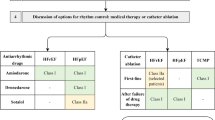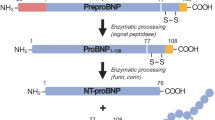Abstract
Background
Hypertensive crisis (HC) is a life-threatening condition in patients with hypertension (HT). However, there is no electrocardiography (ECG) marker that can predict which hypertensive patient may develop HC. The fragmented QRS (fQRS) complex is an important prognostic marker in ECG that might be predict cardiovascular events and mortality. Our study aimed to investigate whether fQRS can predict the development of HC in patients with HT, within 4 years of follow-up.
Methods
Newly diagnosed patients with essential HT were recruited for the study from an outpatient clinic. The patients were divided into two groups according to the presence of HC: HC (+) and HC (−). During follow-up, the relationship between fQRS and HC was evaluated.
Results
The study group included 504 patients with newly diagnosed HT. During the follow-up period, HC occurred in 98 of the patients. In 57 (11.30%) patients, fQRS was observed on ECG; fQRS was detected in the ECG of 19 (19.38%) of the HC (+) patients (p = 0.008). The results of multivariate logistic regression analysis showed that fQRS (p < 0.001) was as independent predictor for HC development. Kaplan–Meier analysis further demonstrated that the presence of fQRS affects the development of hypertensive urgency in hypertensive patients (log-rank p < 0.001).
Conclusion
In patients with newly diagnosed HT, the presence of fQRS was found to be an independent predictor of HC.
Zusammenfassung
Hintergrund
Die hypertensive Krise (HC) stellt eine lebensbedrohende Situation bei Patienten mit Hypertonie (HT) dar. Jedoch gibt es keine Elektrokardiogramm(EKG)-Marker, anhand derer die Vorhersage möglich ist, welcher Patient möglicherweise eine HC entwickelt. Der fragmentierte QRS-Komplex (fQRS) ist ein wichtiger prognostischer Marker im EKG, mit dem sich ggf. kardiovaskuläre Ereignisse und Mortalität vorhersagen lassen. Ziel der vorliegenden Studie war es zu untersuchen, ob sich anhand des fQRS die Entwicklung einer HC bei Patienten mit HT innerhalb eines 4‑Jahres-Follow-up vorhersagen lässt.
Methoden
Für die Studie wurden Patienten mit neu diagnostizierter essenzieller Hypertonie aus einer Ambulanz rekrutiert. Je nach Vorliegen einer HC wurden die Patienten in 2 Gruppen unterteilt: HC(+) und HC(−). Während des Follow-up wurde der Zusammenhang zwischen fQRS und HC untersucht.
Ergebnisse
Zur Studiengruppe gehörten 504 Patienten mit neu diagnostizierter HT. Während der Follow-up-Phase trat bei 98 der Patienten eine HC auf. Bei 57 (11,30 %) Patienten wurde ein fQRS im EKG festgestellt; dabei zeigte sich ein fQRS im EKG von 19 (19,38 %) der HC(+)-Patienten (p = 0,008). Die multivariate logistische Regressionsanalyse ergab, dass fQRS (p < 0,001) ein unabhängiger Prädiktor für das Auftreten einer HC war. Außerdem zeigte die Kaplan-Meier-Analyse, dass das Bestehen eines fQRS sich auf die Entstehung einer Situation mit hypertensiver Dringlichkeit bei Hypertoniepatienten auswirkt (log-rank-p < 0,001).
Schlussfolgerung
Bei Patienten mit neu diagnostizierter HT stellte sich das Vorliegen eines fQRS als unabhängiger Prädiktor einer HC heraus.

Similar content being viewed by others
References
Williams B, Mancia G, Spiering W et al (2018) 2018 ESC/ESH Guidelines for the management of arterial hypertension. Eur Heart J 39:3021–3104. https://doi.org/10.1093/eurheartj/ehy339
Rodriguez MA, Kumar SK, De Caro M (2010) Hypertensive crisis. Cardiol Rev 8:102–107. https://doi.org/10.1097/CRD.0b013e3181c307b7
Von den Born BH, Lip GYH, Brguljan-Hitij J et al (2018) ESC Council on hypertension position document on the management of hypertensive emergencies. Eur Heart J Cardiovasc Pharmacother 5:37–46. https://doi.org/10.1093/ehjcvp/pvy032
Basaran Y, Tigen K, Karaahmet T et al (2011) Fragmented QRS complexes are associated with cardiac fibrosis and significant intraventricular systolic dyssynchrony in nonischemic dilated cardiomyopathy patients with a narrow QRS interval. Echocardiography 28:62–68. https://doi.org/10.1111/j.1540-8175.2010.01242.x
Bozbeyoğlu E, Yıldırımtürk Ö, Yazıcı S et al (2016) Fragmented QRS on admission electrocardiography predicts long-term mortality in patients with non-ST-segment elevation myocardial infarction. Ann Noninvasive Electrocardiol 21:352–357. https://doi.org/10.1111/anec.12314
Das MK, Michael MA, Suradi H et al (2009) Usefulness of fragmented QRS on a 12-lead electrocardiogram in acute coronary syndrome for predicting mortality. Am J Cardiol 104:1631–1637. https://doi.org/10.1016/j.amjcard.2009.07.046
Gulsen K, Ince O, Kum G, Ozkalayci F, Sahin I, Okuyan E (2019) Could fragmented QRS predict mortality in aortic stenosis patients after transcatheter aortic valve replacement? Ann Noninvasive Electrocardiol 24:e12618. https://doi.org/10.1111/anec.12618
Acikgoz E, Yaman B, Acikgoz SK, Topal S, Tavil Y, Boyaci NB (2015) Fragmented QRS can predict severity of aortic stenosis. Ann Noninvasive Electrocardiol 20:37–42. https://doi.org/10.1111/anec.12175
Das MK, Khan B, Jacob S, Kumar A, Mahenthiran J (2006) Significance of a fragmented QRS complex versus a Q wave in patients with coronary artery disease. Circulation 113:2495–2501. https://doi.org/10.1161/CIRCULATIONAHA.105.595892
Tomek J, Bub G (2017) Hypertension-induced remodelling: on the interactions of cardiac risk factors. J Physiol 595:4027–4036. https://doi.org/10.1113/JP273043
Schillaci G, Battista F, Pucci G (2012) A review of the role of electrocardiography in the diagnosis of left ventricular hypertrophy in hypertension. J Electrocardiol 45:617–623. https://doi.org/10.1016/j.jelectrocard.2012.08.051
Pierin AMG, Flórido CF, Santos JD (2019) Hypertensive crisis: clinical characteristics of patients with hypertensive urgency, emergency and pseudocrisis at a public emergency department. Einstein 17:eAO4685. https://doi.org/10.31744/einstein_journal/2019AO4685
Varounis C, Katsi V, Nihoyannopoulos P, Lekakis J, Tousoulis D (2017) Cardiovascular hypertensive crisis: recent evidence and review of the literature. Front Cardiovasc Med 3:51. https://doi.org/10.3389/fcvm.2016.00051
Das MK, Suradi H, Maskoun W et al (2008) Fragmented wide QRS on a 12-lead ECG: a sign of myocardial scar and poor prognosis. Circ Arrhythm Electrophysiol 1:258–268. https://doi.org/10.1161/CIRCEP.107.763284
Marume K, Noguchi T, Kamakura T et al (2021) Prognostic impact of multiple fragmented QRS on cardiac events in idiopathic dilated cardiomyopathy. Europace 5:287–297. https://doi.org/10.1093/europace/euaa193
Jain R, Singh R, Yamini S, Das MK (2014) Fragmented ECG as a risk marker in cardiovascular diseases. Curr Cardiol Rev 10:277–286. https://doi.org/10.2174/1573403x10666140514103451
Femenía F, Arce M, Van Grieken J et al (2013) Fragmented QRS as a predictor of arrhythmic events in patients with hypertrophic obstructive cardiomyopathy. J Interv Card Electrophysiol 38:159–165. https://doi.org/10.1007/s10840-013-9829-z
Das MK, Saha C, El Masry H et al (2007) Fragmented QRS on a 12-lead ECG: a predictor of mortality and cardiac events in patients with coronary artery disease. Heart Rhythm 4:1385–1392. https://doi.org/10.1016/j.hrthm.2007.06.024
Kanjanahattakij N, Rattanawong P, Riangwiwat T et al (2018) Fragmented QRS and mortality in patients undergoing percutaneous intervention for ST-elevation myocardial infarction: Systematic review and meta-analysis. Ann Noninvasive Electrocardiol 23:e12567. https://doi.org/10.1111/anec.12567
Chan JSK, Zhou J, Lee S et al (2021) Fragmented QRS is independently predictive of long-term adverse clinical outcomes in asian patients hospitalized for heart failure: a retrospective cohort study. Front Cardiovasc Med 8:738417. https://doi.org/10.3389/fcvm.2021.738417
Author information
Authors and Affiliations
Corresponding author
Ethics declarations
Conflict of interest
E. Altuntas and S. Cetın declare that they have no competing interests.
For this article no studies with human participants or animals were performed by any of the authors. All studies mentioned were in accordance with the ethical standards indicated in each case.
Rights and permissions
About this article
Cite this article
Altuntas, E., Cetın, S. Fragmented QRS as a predictor of hypertensive crisis in patients with newly diagnosed essential hypertension: 4-year follow-up data. Herz 48, 474–479 (2023). https://doi.org/10.1007/s00059-023-05194-2
Received:
Revised:
Accepted:
Published:
Issue Date:
DOI: https://doi.org/10.1007/s00059-023-05194-2




